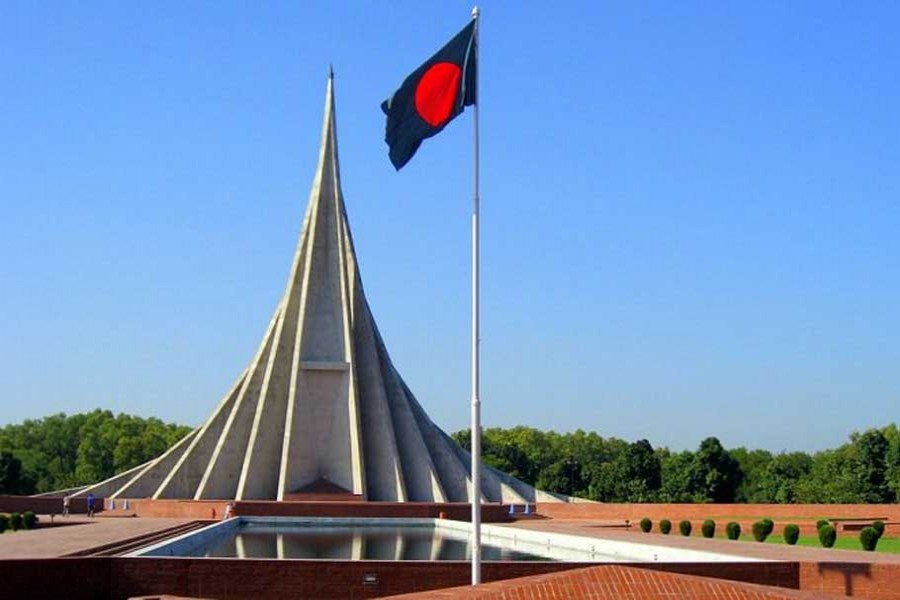
Published :
Updated :

Today the nation is celebrating its 50th Victory Day, the day it vanquished the enemies of its independence and freedom. The moment of victory after waging a tortuous war of liberation against the enemy is indeed an occasion of great pride and fulfilment in the life of a nation. And it is also an occasion to reflect upon, when one is commemorating the day half a century after it dawned. Winning a freedom struggle cannot be an end in itself in a nation's life. In fact, it only marks the beginning of yet other struggles that follow once the political freedom of a people is achieved. If truth be told, Bangladesh has witnessed too many ups and downs within the span of close to five decades of its history since the war of independence. After defeating the external enemy, the people were faced with their internal enemies-the enemies of their economic freedom and of their democratic rights. It had also to deal with the scars a society is left with in the aftermath of a transformative revolutionary change in a society like an independence struggle. In fact, the post-independence instabilities had a lot to do with settling the issues that the nation was handed down as a legacy of its pre-independence past. The issues were social, political, cultural and economic in nature.
Some of those struggles the people have won, while others they are still carrying on with. On the post-war national reconstruction front, it was faced with two uphill tasks. One, rebuilding a war-ravaged economy. Two, rehabilitating some ten million externally displaced people. Also, there were tens of millions of internally displaced people to be rehoused. There were also the tasks of restoring and rebuilding the devastated physical infrastructures. To make matters worse, the country had few natural resources and a large population living within a very small land area. Evidently, the post-independent leadership and war-weary people were encountering a formidable challenge of nation building. But undaunted, the leadership proved to be equal to the challenge. Despite some initial reverses, the people overcame most of the major stumbling blocks one by one. Small wonder that over the past few years, the country has been able to shake off its image problem largely attributable to its economic backwardness.
Consider the issues it had been preoccupied with since its pre-independence days: alleviation of poverty, arresting population boom and achieving self-sufficiency in food. Its efforts towards meeting most of these challenges have been exemplary. Not surprisingly, those have won acclaim from far and wide. On the economic front, too, the nation has made great strides. The nation's annual budgets are no more foreign-aid dependent. Export earnings from the readymade garment (RMG) sector and the patriotic remittances from the migrant workers have gone a long way in weaning the nation off aid-dependence.
The successful completion of the Padma Bridge, a multi-billion dollar mega-project with the country's own resources is itself a testament to that assertion. But still, everything is not hunky-dory. And also, there is hardly any room for complacency. Creating jobs for all the able-bodied adults, removing social inequity, addressing rural-urban development disconnect and ensuring health care for all are to mention some of the yet unresolved issues.
Needless to say, on their proper addressing hinges to a large extent how the nation would move further forward. Last but not least, the nation at the moment is fighting history's worst existential threat from the pandemic, Covid-19. As the pandemic is a global threat to humanity, it cannot be said that Bangladesh is alone in this fight against the scourge. While it was expected that the entire world would fight as one against this common threat to all people across the world, in real practice, each country has been left to their own devices to fight the new pandemic. This has been due to lack of global leadership in the face of this war against the coronavirus. This is unfortunate. But that is no reason why Bangladesh should not succeed in its struggle against this yet another challenge before its people, who is well known for their resilience in the face of adversity.
To win the war against this invisible enemy, what would be required are utmost courage and pragmatism on the part of the leadership. It is believed that the nation and its leadership are up to the tasks facing them. The imperative is to take all the challenges in their stride.


 For all latest news, follow The Financial Express Google News channel.
For all latest news, follow The Financial Express Google News channel.